I Dig Sports
Marnus Labuschagne provides dash on day of Glamorgan grit
Published in
Cricket
Tuesday, 11 June 2019 10:55
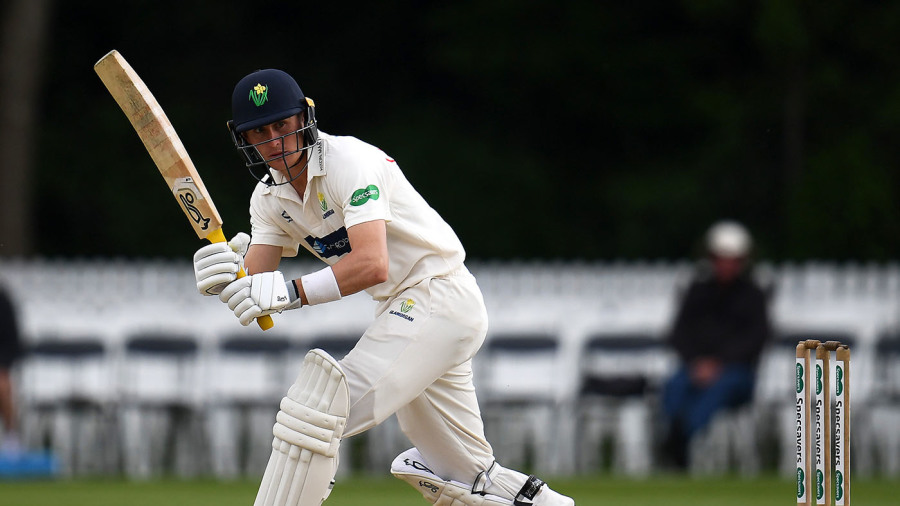
Glamorgan 167 for 5 (Labuschagne 37) v Derbyshire
Glamorgan reached 167 for 5 on a rain-affected first day of their Specsavers Championship match at the St Helen's ground in Swansea. Four batsmen were dismissed between 28 and 37 as a day that started late was ended by bad light 24.3 overs before the scheduled close.
Derbyshire's seamers kept a tight rein and made the batsmen work hard for their runs, Marnus Labuschagne the only man to prosper while hitting six fours and a six in 37 from 36 balls.
There was no play before lunch and following an uncontested toss Tony Palladino struck with the fourth ball of the innings when he had Nick Selman leg before - the batsman attempting to turn a straight ball to leg.
Labuschagne and Charlie Hemphrey then shared a partnership of 54 for the second wicket, with Labuschagne the dominant partner. The Australia Test batsman scored freely and it came as something of a surprise when he edged a catch to slip in Luis Reece's opening over.
Hemphrey played a more patient innings, taking 74 balls to score 32, before he was also trapped leg before by Palladino, who bowled a steady second spell on a pitch where was enough encouragement for the five Derbyshire seamers.
Glamorgan's acting captain David Lloyd, who has been short of runs recently, struck some early boundaries, and started to get into his stride when he drove Logan van Beek to cover, where Tom Lace did well to hold on to a low catch.
After his career-best 229 against Northants last week, Billy Root struck some early boundaries, but after scoring 28, sliced a catch to slip, where Wayne Madsen, in the freezing conditions, held on to a sharp catch.
Owen Morgan, who has deserved his chance in his first Championship game of the season after some impressive performances for the 2nd XI, was undefeated on 28 with Dan Douthwaite on 5 when the umpires mercifully ended play on a day more suited to November than early June.
"We would have taken that score after the uncontested toss," Lloyd said at the close. "It was quite tricky at times and although most of the batsmen got into the thirties, no one managed to kick on. You never felt in, although they bowled well throughout. It is up to us to kick on in the morning and build on the overnight score."
Tagged under
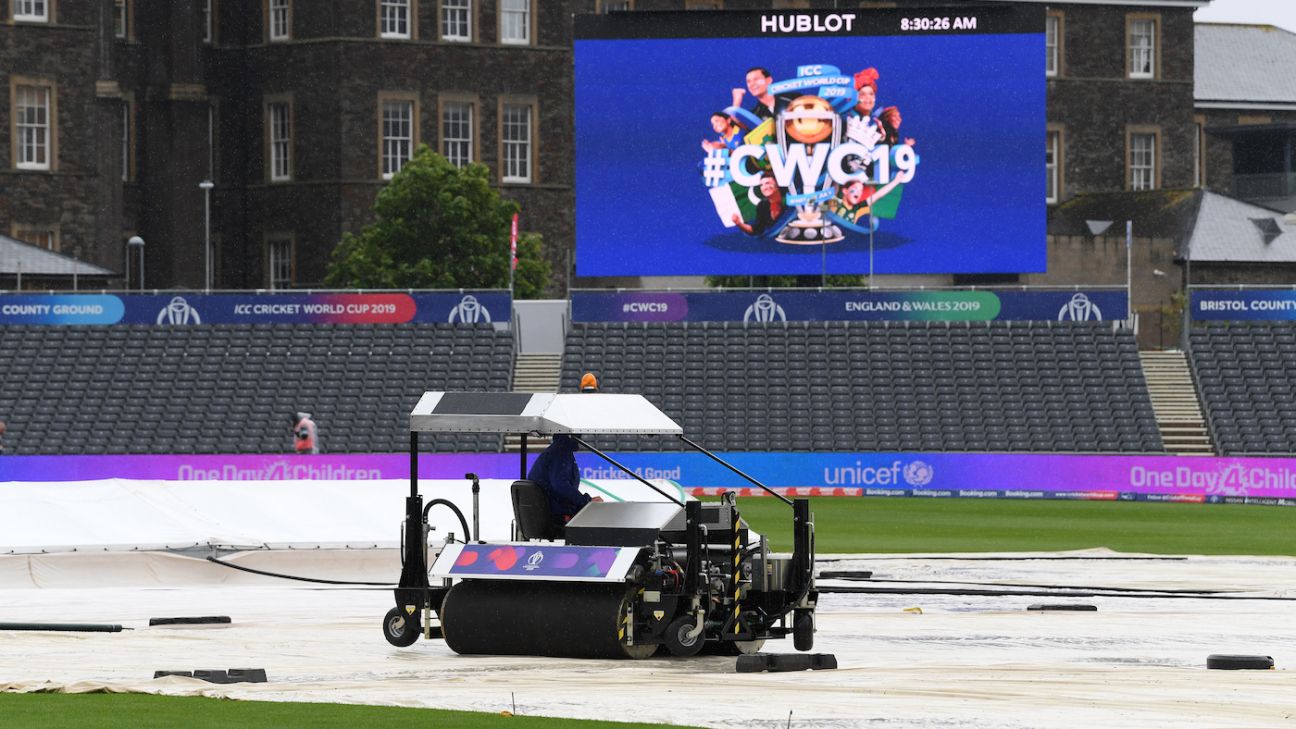
"We put men on the moon, so why can't we have a reserve day, when actually this tournament is a long tournament," Steve Rhodes asked in jest after Bangladesh were forced to split points after a washout against Sri Lanka in Bristol on Thursday.
Rhodes was reacting to a question on the number of rained out matches - three so far in this edition alone, and the second straight day of no results. This left Bangladesh precariously placed, with a win and a washout after four matches. No other edition has seen these many rain-affected matches in the tournament's history.
Rhodes, who hails from Worcestershire, also felt there was a case to fit in reserve days as most sides had at least "two to three days" between matches. Bangladesh, for example, have a five-day gap before their next game against West Indies in Taunton.
"I know logistically it would have been a big headache for the tournament organisers," Rhodes began at the post-match press conference. "I know that it would have been difficult, but we have got quite a lot of time in between games, and if we have got to travel a day later, then so be it.
"The games are spread out. I would say that it's disappointing for the crowd, as well. They have got tickets to see a game of cricket, and you know it would be up to them if they can get there the day after."
Dimuth Karunaratne, the Sri Lanka captain, didn't think Rhodes' suggestion was feasible. "If they could put a reserve day it would have been fine. But it's a major tournament and we're all playing nine games. I don't know if they can keep a reserve day for us," he said.
"The next day you have to travel to a different venue, so it's not easy. If they can put a reserve day, though, it's going to be good for the all the spectators and everyone."
Tagged under
Dot-ball pressure, early wickets key to beating India - Lockie Ferguson
Published in
Cricket
Tuesday, 11 June 2019 08:43
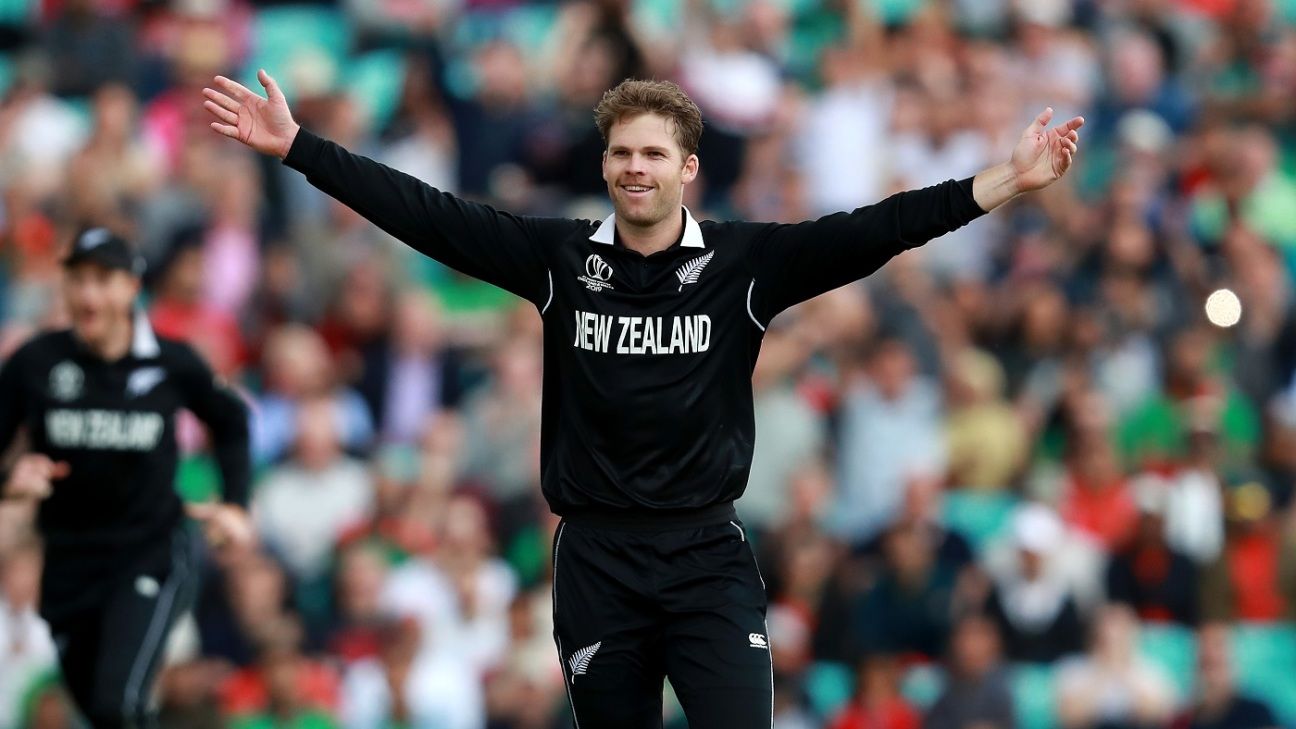
Roll into town. Assess the conditions. Do your homework on the opposition. Play well. Get the win. Forget it. Roll on the next town. Repeat.
Sounds both simple and sensible, doesn't it?
That's been the mantra for New Zealand's campaign and, so far, it's worked a perfunctory treat. Three wins from three games, virtually all players making significant contributions and conditions suiting their strengths nicely. But now their matter-of-fact approach will, weather permitting, face their biggest challenge to date in the World Cup when they, weather permitting, meet India on Thursday. Did I say weather permitting?
The forecast makes it doubtful that either team will be able to do any outdoor training before the match and, while some might think getting a point out of a washout wouldn't be the worst outcome against one of the top-ranked teams, Lockie Ferguson isn't one of them.
"We want to play," Ferguson said on Tuesday. "It's the World Cup. We're playing against India in the World Cup and it's an opportunity to get two points and we don't want to get rained-out games. I don't think any players do but if that happens then so be it. We can't control that but we're looking forward to playing India and getting some confidence against them."
Ferguson has only played three ODIs against India, all of them in January this year. India won all three matches comfortably and Ferguson was the subject of particularly harsh treatment in the second game at Mount Maunganui, where he took two wickets but conceded 81 runs from his ten overs. Now he's keen to use the lessons learned.
"They showed us that they're probably a lot more patient in a way," Ferguson said. "And although we're looking to take wickets, sometimes we got a little bit expensive. I think taking wickets up front is the key to [beating] India but, if not, creating pressure and building dots.
"They're world-class players, you're not going to blow them out of the water, but if you can build up enough pressure against them and then create a half-chance, that could be the wicket and you can then build from there. Obviously, they're playing some great cricket and they're one of the top teams in the competition but we're definitely looking forward to the opportunity of playing them in England and we haven't played them for a while in England."
New Zealand have bowled out all three sides they have faced so far - Sri Lanka (136), Bangladesh (244) and Afghanistan (172) - with Trent Boult arguably the unluckiest in the attack, wicketless despite beating the bat and drawing false shots regularly. Ferguson believes it's only a matter of time before Boult's form is rewarded with wickets.
"If I were to critique his bowling I think he's been bowling exceptionally well, creating a lot of chances for us up front," Ferguson said. "And that's the nature of international cricket; sometimes the chances don't get taken but other times they do. Trent's world-class, very professional guy and the way he talks about his bowling is pretty inspiring if I'm honest. I'm sure it'll turn his way soon and hopefully it's on Thursday, that would be great."
Undoubtedly, the bounce that has been on offer in the matches at Trent Bridge has New Zealand's pacers salivating, just a little, and Ferguson admitted they had watched the results and conditions with interest, although they will not be playing on the world-record pitch that has been used twice so far in this tournament.
"It's exciting for Trent Bridge to have a bit of bounce and hopefully that'll go in our favour," Ferguson said. "It's been an interesting start to the World Cup with the games here obviously we keep an eye on the different grounds and how the matches go.
"But the West Indies showed that there's that extra bounce at Trent Bridge and that caused some trouble for Australia as well, who are good players of the short ball. It's tournament cricket where, if you can create a bit of pressure, it sort of builds up a little bit because you play each team once and you need to win and move on.
"Tournament cricket's one of those crazy ones where, I know in the Black Caps, we talk a lot about turning up to the ground we are playing, working out the conditions, the team we are playing, doing the scouting, playing the team as well as we can and then we've been fortunate to get three wins and play some good cricket and then moving on to our next opponent.
"That's one of our main focusses for the Black Caps. We often talk about it but more in particular at a World Cup where every team you play is worth two points so they're just as important as each other."
Ah, there it is. Win and move on. Rinse and repeat. Simple. Both teams have done it so far; India twice, New Zealand thrice. But only one can win and move on from Trent Bridge.
Weather permitting, of course.
Tagged under
Warner needs 'a little mindset change' to go from slow to spectacular
Published in
Cricket
Tuesday, 11 June 2019 09:28
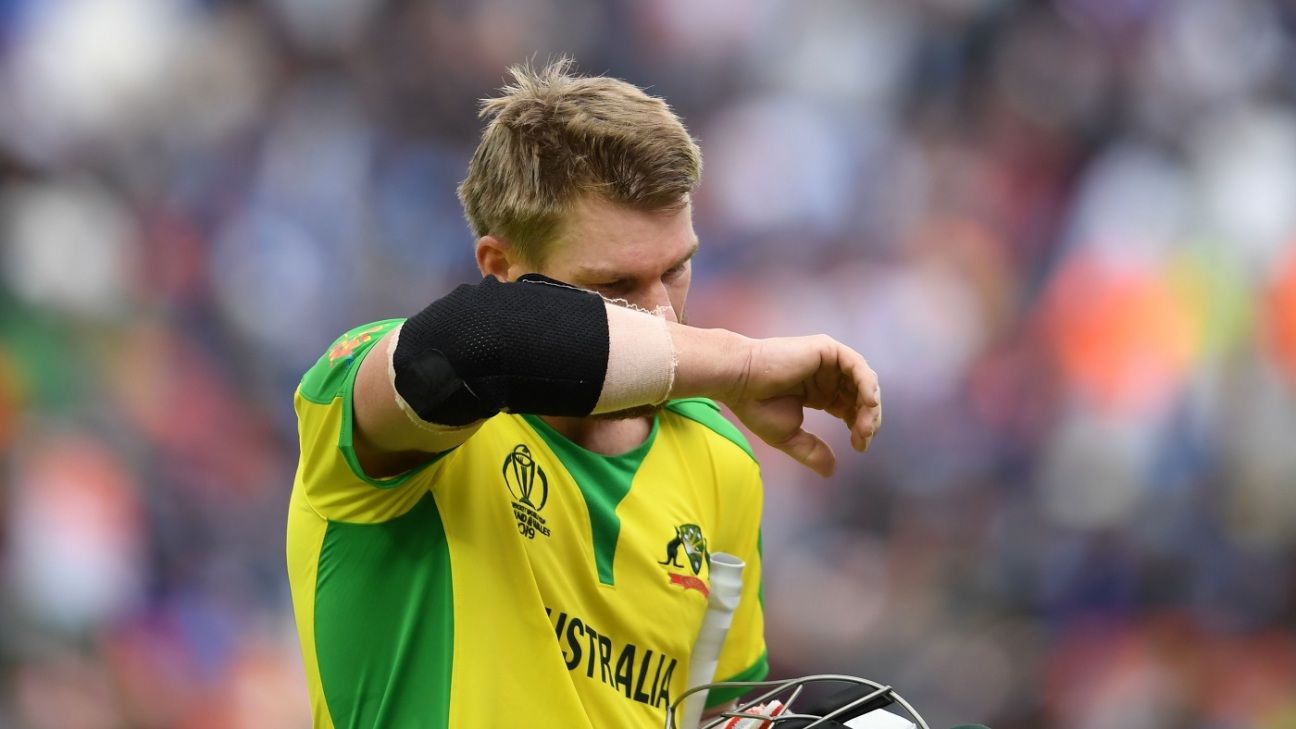
David Warner is a meme in Pakistan now. His face has been superimposed on the face of a model selling a washing powder, and issuing an open challenge to other competitors. The text explanation makes it clear that this is Warner's battle cry against Imam-ul-Haq's claims to be the slowest left-hand opener in the Wold Cup.
At any rate, Imam is now using Warner's slow and cautious starts to vindicate his style: 350 in a World Cup is greater than 350 in a bilateral series, Imam tells ESPNcricinfo. The pitches are slightly more difficult, he says. See, even Warner is taking his time, he points out.
Indeed, among those who have played 50 balls in the Powerplay this World Cup, Warner is the slowest, going at a strike rate of a little over 50 in that phase of the innings. Against Afghanistan, he scored his slowest ODI fifty, and against India, he went ahead and relegated that Afghanistan effort to his second-slowest.
"He's still batting beautifully at the moment. He just hasn't got off to that flow that we're used to" AARON FINCH IS BACKING HIS OPENING PARTNER TO COME GOOD
Except that, unlike with Imam, it is not a team plan because of the grand occasion. Warner is not batting with the mindset of Imam or, say, Rohit Sharma, the second-slowest man on the list. Rohit is, in fact, master of batting this way; his strike rate in the Powerplay this World Cup has been 57, and yet he has an overall strike rate of 83.64. Warner has not been able to kick on after the slow starts, striking at 71.84.
Warner's numbers haven't gone unnoticed in the Australian team management. After the India game, Ricky Ponting said Warner wasn't at his absolute best, and that he knows and admits that. Too many shots were hit straight to the fielders, which is the opposite of a batsman in good form.
"It's not a team plan," Aaron Finch said on the eve of their match against Pakistan in Taunton. "I think the last couple of games, the last game in particular, India bowled really well at the start and he (Warner) hit the field a lot, which as an opening batter, as a top-order player, when the field is in that you do generally face a high percentage of top bowlers. And I suppose when the field went out he still hit them fielders, which didn't give the innings a huge amount of flow, which I know he was disappointed about.
"But at the same time, every evidence suggests he'll be back to his dangerous best. And when you give good players an opportunity, and might be just a little mindset change with Davey… I'm not sure, I haven't spoken to him a huge amount about his batting. I know he's been working a bit with JL [Justin Langer, the coach] and Ricky Ponting [the assistant coach] to just make sure he's in the right mind frame."
After the first game, Warner admitted his feet were not moving that well. Didn't we see the same Warner smash it all over in the IPL, though? Finch says there are two differences: pitches and bowling attacks.
"Totally different wickets," Finch said. "You have to remember that Indian wickets are quite low and quite skiddy with the new ball, which allowed him to use his hands and stand really still and hit the gaps. Whereas, there's been just enough in these wickets first up that it doesn't allow you to just walk out and hit through the line and blast attacks all over.
"And you're talking about world-class opposition here. You're not playing a club team where you can find one target and target them really hard. Each team is super strong. So, at times, it's about taking calculated risks to get your innings and get your momentum in your game. He's still batting beautifully at the moment. He just hasn't got off to that flow that we're used to."
There has been enough rain around to leave enough spice in the pitches to require good footwork to be able to access gaps. By all accounts, Warner hasn't quite reached there yet, but words such as "mindset" and "calculated risk" make it interesting.
Most of the times, for batsmen skilled enough to play international cricket, batting is about managing risk. If a batsman as good as Warner feels there is undue risk in trying to force the pace, the conditions must be that little bit extra challenging or bowling that good.
However, on air, Kumar Sangakkara made an interesting observation. He feared this new Warner might be too worried about wanting to succeed. Might be too afraid to get out. It might have been easier for Warner to take risks earlier, he might be erring on the side of caution. That he needs to be freed of that care.
Probably this is the mindset change Finch talked about. Perhaps it might be just one innings where he starts finding the gaps and everything falls back in place. And being the batsman that he is, Warner backs himself to be able to do it without taking undue risks.
Amid all this, Warner's struggle and his desperation to hang in and not leave things to chance by using his bat like a swinging door is a reminder of things we, as spoilt fans, can take for granted: how much needs to go right for what comes across as effortless batting to us?
Tagged under
England relish 'fear' factor provided by pace of Archer and Wood
Published in
Cricket
Tuesday, 11 June 2019 10:03
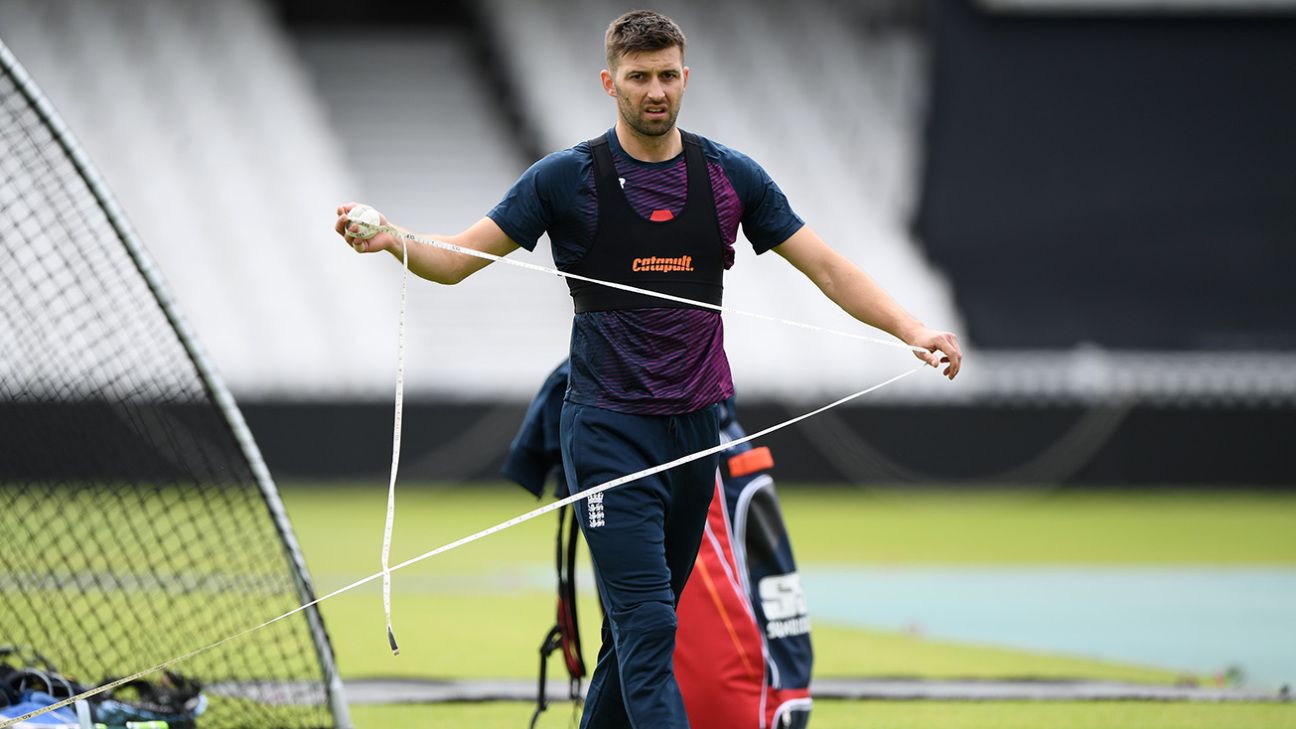
Mark Wood believes England have a fast-bowling attack at the World Cup that "ruffles feathers" and creates fear in the opposition.
Wood, who has sent down the fastest delivery of the tournament so far, is one of four England bowlers to have recorded bowling speeds of 90mph in and one of two to have recorded a speed of 95mph. As a result, he believes "opposition batsmen don't get a break".
"When real pace bowling is on show it definitely ruffles a few feathers and changes the momentum of the game," Wood said. "It wasn't long ago that everyone was looking round for quick bowlers while Australia had Mitchell Johnson, Mitchell Starc and Pat Cummins. It is nice to have guys who will fear our team now.
ALSO READ: Archer presence adds spice to England v West Indies
"The opposition batsmen don't get a break if there is pace from both ends. There is no respite from us. It is great that we can pose that threat."
Wood admitted there is rivalry between him and Jofra Archer - the other England bowler to have hit 95mph - over who can bowl quicker, but insists it is friendly and positive. Wood has edged ahead, bowling a ball timed at 95.69mph/154kph against Bangladesh, though he concedes Archer appears to find it much easier to hit the high speeds.
"It is friendly competition, but with a point to it," Wood said. "It pushes us for sure. You're pushing each other to be the best you can be and to as quick as you can be.
"I'm trying to bowl 0.1 mph quicker than Jofra and he's trying to bowl 0.1 faster than me. When you come off the analyst says 'oh, Jofra was quicker today' and you think, right I've got to put the throttle down here, and then the next time he says 'you were quickest' you get a little buzz.
"But all the while though I'm thinking, 'but Jofra's just flicking his wrist and it is coming out like a rocket!' I think there might be a bit more in the tank if he really wants it, I think he's just toying with me at the minute. You have banter about it for sure, but you're helping each other.
"Jof keeps saying that my speeds come up on the big screen and his don't. I just tell him they are putting mine up to tell me to bowl a bit quicker to catch up to him. It is a good competition between us, a friendly one.
"It is great coming up against the West Indies again because it is a team I've had success against. I hope they are worried about facing me" Mark Wood
"Jofra helps me get wickets, too. In the past I was probably the guy that England were looking for to produce those speeds. Having Jof there takes a bit of pressure off.
"It's exciting and frustrating because he makes it look so easy. I have to nearly break my back to get it as fast as him and he's got no problems cranking it up. It looks like effortless pace and it surprises people how quick he is."
Wood suggested there is a good chance that Friday's match against West Indies will turn into a battle of the fast bowlers. Certainly the hostility of West Indies' attack has been a feature of this World Cup to date and, with the Southampton surface expected to offer some bounce, Wood felt there may be a fair amount of short-pitched bowling on display.
"Could short-pitched bowling have a big role to play? I think so," he said. "The pitch in Southampton tends to offer a bit of tennis-ball bounce so it would suggest that the back-of-a-length ball might be more successful than the full ball.
"The Windies in this World Cup have come with a clear game plan and that is a lot of short stuff. We got a taste of that on the recent Caribbean tour and one of the things we spoke about in St Lucia - when we were bowled out for 113 - was that the pitch had tennis-ball bounce and if we come up against it again we will play some smarter cricket. It will be interesting to see how we go about it as a batting group to combat that. We know what we are going to get.
"But I thought that in the West Indies they struggled with the short ball as well. I can remember getting Darren Bravo and Shimron Hetmyer out to short balls so it is a good thing we can fight fire with fire.
"It is great coming up against the West Indies again because it is a team I've had success against. I hope they are worried about facing me and that I can get amongst them again."
Tagged under
Cerrone: No broken orbital, wants Ferguson again
Published in
Breaking News
Tuesday, 11 June 2019 11:26
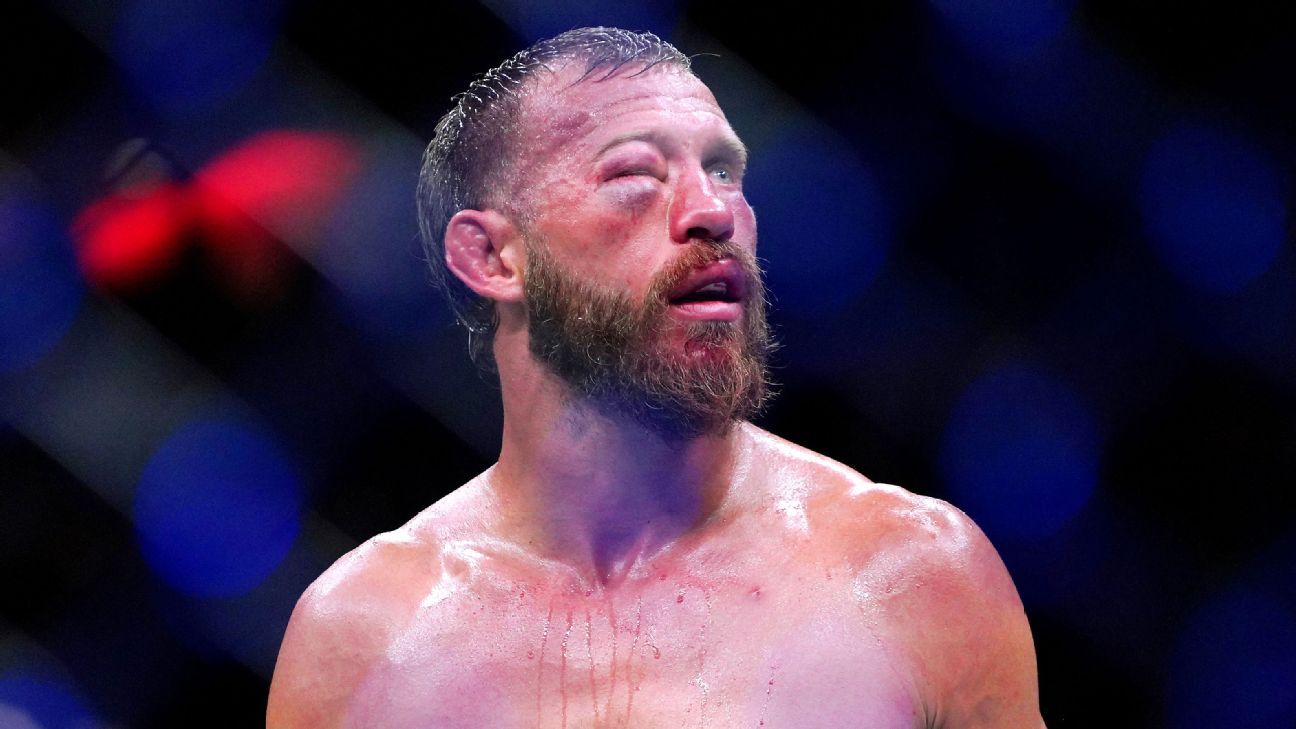
Donald Cerrone says he got a relatively clean bill of health after a bloody war with Tony Ferguson last weekend.
"Cowboy" wrote Tuesday on Instagram that he didn't break any bones and did not have a broken or cracked orbital bone stemming from the UFC 238 war Saturday night in Chicago. UFC president Dana White previously stated at the post-fight press conference that Cerrone went to the hospital with a broken orbital.
Ferguson won the fight by TKO after the second round when ringside physicians ruled that Cerrone could not safely go on. Cerrone's right eye was completely swollen shut. "Only air was in my eye," Cerrone said. "No broken bones nor cracked or broken orbital."
Cerrone added that he's waiting for a Ferguson rematch or his next fight.
Cerrone (36-12, 1 NC) was on a three-fight winning streak heading into the bout and was closing in on a lightweight title shot. The New Mexico resident earned a $50,000 Fight of the Night bonus with Ferguson for the bout. Cerrone, 36, has the most wins (23) and finishes (16) in UFC history.
Tagged under
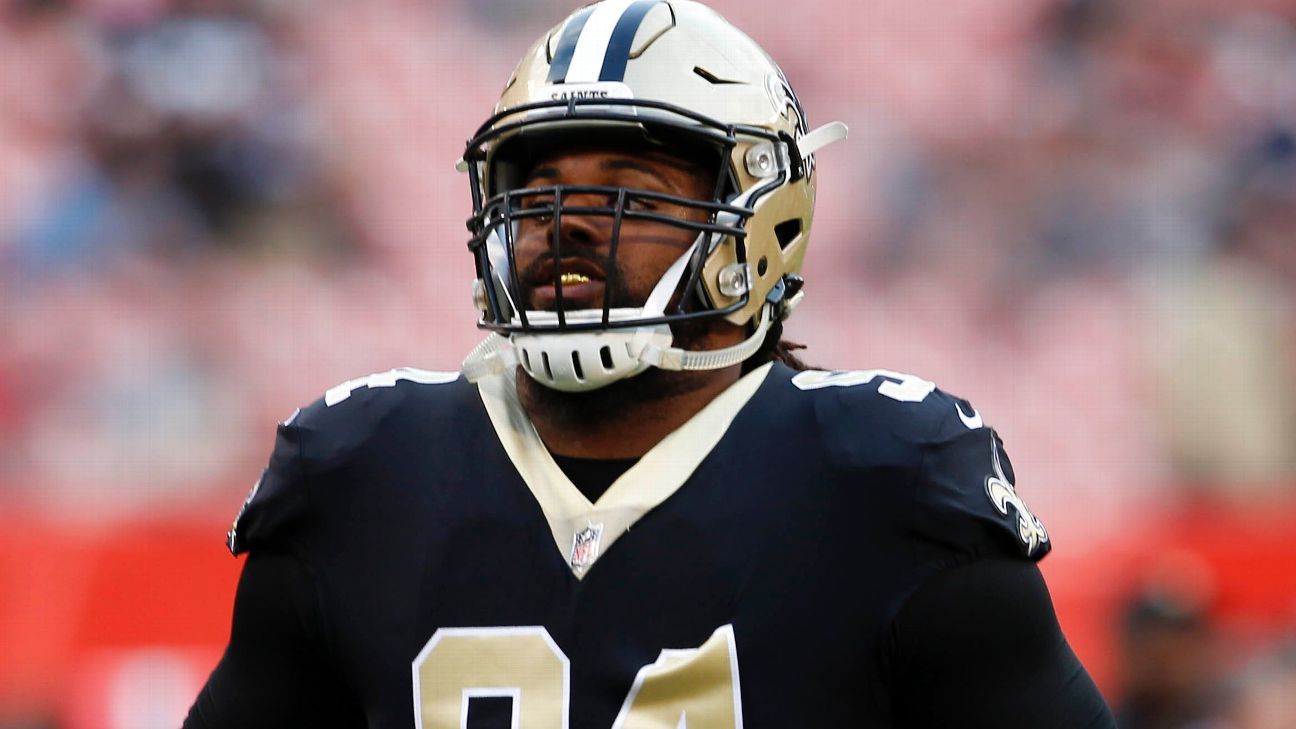
New Orleans' four-time Pro Bowl defensive end Cameron Jordan and the Saints reached agreement on a big three-year contract extension that will contractually tie the two sides together for the next five seasons, through the 2023 season, sources tell ESPN.
Jordan's extension, engineered by agent Doug Hendrickson of Wasserman and the Saints' vice president of football administration Khai Harley, is a three-year, $52.5 million deal with a max of $55.5 million that includes over $42 million in guaranteed money, per sources.
Jordan, who turns 30 on July 10, wanted financial security now, and the Saints wanted to keep one of their top players and leaders happy, with the team trying to ensure that he finishes his career in New Orleans. He now has five years and a maximum value of $74 million left on the deal after Tuesday's extension.
The first-round pick in 2011 had two years left on a five-year extension that he signed in 2015 worth between $55 million and $60 million.
But that was before the 29-year-old really exploded into the player he is now (a first-team All-Pro in 2017 with 13 sacks and a second-team All-Pro in 2018 with 12 sacks). It was before he established himself as one of New Orleans' core leaders in the locker room and in the community. And it was before the NFL's elite edge rushers started getting paid almost as much as quarterbacks.
The Chicago Bears' Khalil Mack is averaging more than twice as much as Jordan at $23.5 million per year. DeMarcus Lawrence and Frank Clark also joined the $20 million club this year.
ESPN's Mike Triplett contributed to this report.
Tagged under
KD's injury impact, bold predictions and big Finals questions
Published in
Breaking News
Tuesday, 11 June 2019 07:34
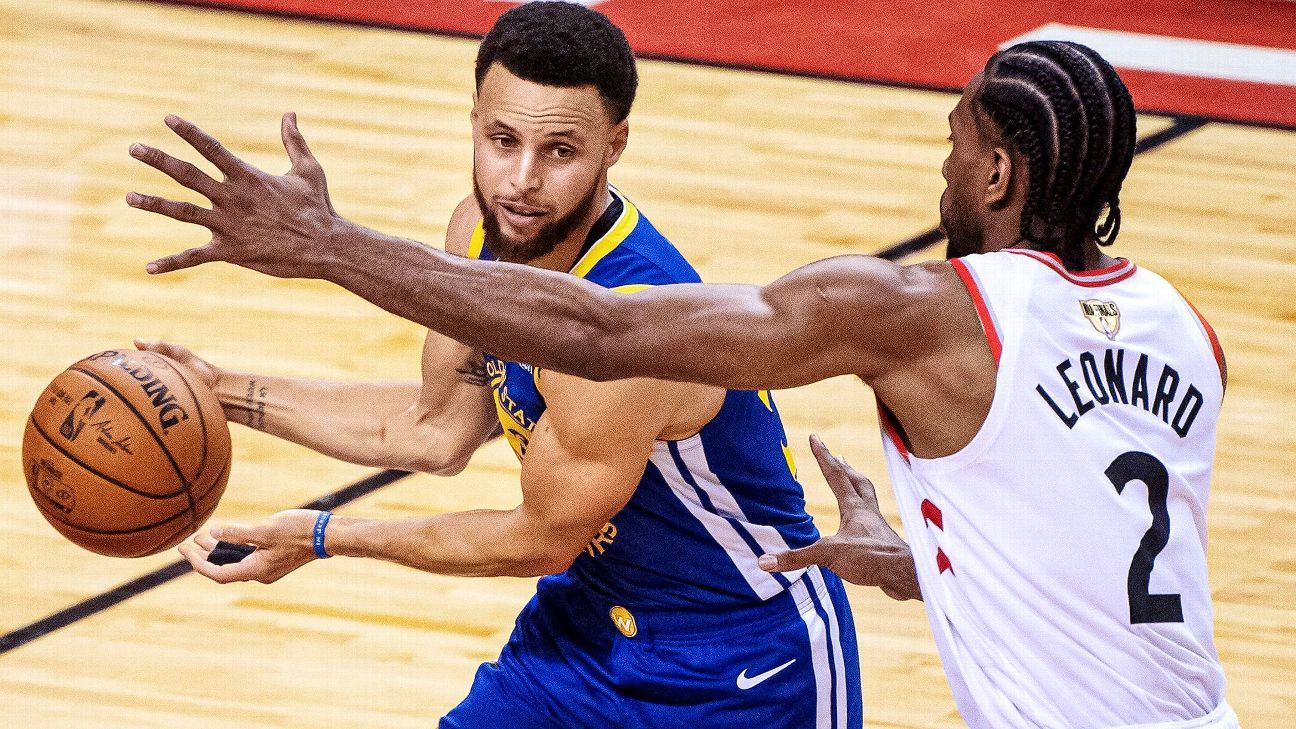
The Golden State Warriors are one win away from forcing a Game 7 in the NBA Finals, but they'll need to plan on doing it without All-Star forward Kevin Durant, who went down with an Achilles injury on Monday.
What does Durant's injury mean for the rest of the series against the Toronto Raptors? How likely is a Raptors title after they dropped Game 5? What are the biggest things to watch in Game 6 (9 p.m. ET Thursday on ABC/ESPN App)?
Our NBA experts answer the big questions and make predictions.
1. What does Kevin Durant's injury mean for this series?
Brian Windhorst: The Raptors had better win one of the next two games and then never say they're sorry -- winning a championship means never saying you're sorry for how it happened. If the Raptors can't do that, the last three minutes of Game 5 will dog them until the end of their days. For the Warriors, it means they are on a total free roll. No one expects them to recover from this. Do it, and they're (expletive) giants.
Kirk Goldsberry: Steve Kerr and the Warriors will have to find ways to score without KD. Per Second Spectrum, the two most used plays for the Warriors this season were Durant post-ups and Durant isolations. He's the centerpiece of their offense, and he won the Finals MVP award in each of the previous two years for a reason. He was the best scorer in these playoffs, and his injury means the Splash Brothers will have to overcome increased defensive attention and find ways to replace a big chunk of KD's production. In Game 5, they did so with an all-time 3-point shooting performance, even by their standards. It's doubtful the Warriors can get 20 3s again in Game 6. Where will the points come from the rest of the series?
Tim Bontemps: Toronto is firmly the favorite once again. Durant's arrival back on the scene threw everything up in the air, and his performance before going down (11 points in 12 minutes) showed the world why. But without Durant -- and potentially Kevon Looney, who exited the game after aggravating the chest injury he suffered earlier in this series -- it's hard to see how Golden State can summon enough to pull off two more games, no matter how much championship DNA remains.
André Snellings: The Raptors have appeared to be the better team in this series when Durant is out. They are longer and more athletic than the Warriors, able to maintain offensive and defensive pressure that Golden State seems unable to overcome. The jury was out on whether Durant's presence would change that dynamic, but given Durant's Achilles injury, Toronto should be the clear favorite to win one of the next two games.
Kevin Pelton: In one sense not much, given that the Warriors have played 228 of the 240 minutes in the series so far without him. In some ways, the game plan changes more if Looney is unable to continue. But in another sense, Golden State's best hope of winning this series always included Durant coming back healthy, and that's no longer on the table. So obviously, the Warriors' chances take a hit.
2. What has been your biggest takeaway from this series so far?
Goldsberry: Unfortunately, our understanding of load management and injury risk remains inadequate. Durant's Achilles injury represents a troubling new data point in the world of sports medicine. Even at the highest levels, we still don't have a firm grasp on how, why and when injuries occur.
Windhorst: Kawhi Leonard is a historically great player. He should've had a historically great moment with his brilliant stretch in the fourth quarter, but for various reasons, it didn't happen. In a mess of a series, he is the shining light.
Pelton: That it's a make-or-miss league. The winning teams have made 41% of their 3-point attempts so far, compared to 31% for the losers. The contrast was especially strong in Game 5, when the Raptors shot better on 2s, made 11 more free throws, took three more shots than the Warriors did and lost the game because of Golden State's 20-8 advantage on 3s.
Bontemps: That we'll never know what could've been. These were the two best teams in the league this season. They had the second- and third-best records, but both were clearly pacing themselves for the playoffs. Durant was playing out of his mind before he got hurt against the Houston Rockets, and Leonard has been the best player in the playoffs. There are stars on both sides and creative coaches. There is so much to be excited about. Instead, the overwhelming takeaway is going to be that it just isn't what it could've been, had everyone been healthy.
Snellings: The Raptors were better than advertised, built with an old-school championship formula that seemingly was no longer in vogue: a big, defense-minded group with balanced output around a single, transcendent superstar. The Raptors were a 58-win team this season, with Leonard sitting 22 games for maintenance and not fully carrying the load when he played during the season. However, in the postseason, the Raptors have shown the ability to up their level in a way that, thus far, no other team has been able to match.
3. What will you be watching most closely in Game 6?
Pelton: DeMarcus Cousins' productivity. Understandably as he works his way back from injury, Cousins has been wildly up and down in this series, averaging 12.5 points and 8.0 rebounds in the Warriors' wins and 4.3 points and 2.3 rebounds in their losses. (That includes Game 1, in which Cousins played just eight minutes.) After Durant went down, Cousins' scoring punch was crucial to Golden State's hanging on and coming back in Game 5. Golden State will likely need similar production in Game 6.
Goldsberry: The offensive production of the Warriors' role players. Outside of Klay Thompson, Steph Curry and Draymond Green -- who are combining to average 70 points per game in this series -- which Warriors can produce points? I'll be watching Cousins and Andre Iguodala. One or both of them has to get buckets if the Warriors are going to force a Game 7.
Snellings: Is Kawhi taking care of the ball? Leonard is averaging 2.0 turnovers in the Raptors' three wins and 5.0 turnovers in their two losses. When the Raptors are locked in, the supporting cast is playing well enough that Leonard doesn't have to force it. When he is able to take what the defense gives him, he can play downhill, and the Raptors look inevitable. If Kawhi's turnovers are high, that generally means he is forcing things, and he usually does that only if the team is scuffling.
Bontemps: How Toronto's role players perform. If those players knock down shots, as they did in Game 3 and much of Game 4, the Raptors can get another win at Oracle and close out this series. But if they don't, like we saw in Game 5? Then we could easily be back in Toronto for Game 7 on Sunday.
Windhorst: The Warriors' spirit. It has been tested many times during this season and especially during the playoffs. The Warriors have consistently been able to rise up and deliver because they are a championship team. But these circumstances are so brutal that it's hard to know how they will feel. Game 6 being the last game at Oracle might help in this regard.
4. What is closest to your view?
A. Raptors' 76% chance to win series (initial BPI projection)
B. Raptors' 69% chance to win series (initial 538 projection)
Snellings: A. Toronto let a golden chance slip away in Game 5, and the Warriors are always dangerous at Oracle, but the Raptors have consistently been the better team in this series. Even in their two losses, the Raptors had every opportunity to win, despite playing relatively poorly by their standards. They have two chances to play one "normal" game and close this out, which looks likely.
Goldsberry: I'll go with A given the injuries and the fact that Toronto has already won two games at Oracle.
Bontemps: A. The combination of the Raptors having to win only one game and the number of injuries Golden State is dealing with leaves the Warriors at a severe disadvantage. It's not impossible to overcome, but it won't be easy.
Windhorst: With all due respect, there isn't a computer model in existence that could've projected what has happened in this series, and I think it would be foolish to think that would start now.
Pelton: A. The biggest difference between the two metrics at this point presumably is that 538 was previously factoring in the possibility of Durant playing. Without him, I'd lean toward BPI's view. Game 7 has been won nearly 70% of the time by the home team when both sides are evenly matched. Although there's a trend toward declining home-court advantage, Toronto's chances in that game should be considered better than 60%.
5. What is your bold prediction for the rest of the Finals?
Bontemps: I'm not sure how bold it is, but I think Toronto will win Game 6. The Raptors let Game 5 get away, yes, but Golden State without Durant shouldn't have the firepower to beat Toronto. The Warriors couldn't do it in Games 3 and 4. I'll say they can't in Game 6 either.
Windhorst: This series is beyond predictions.
Goldsberry: The last big basketball moment in Oracle Arena will be Toronto celebrating its first NBA championship. The Dubs are just too banged up, and the Raps should win Game 6 just like they won Games 3 and 4 -- by overpowering the thinnest Warriors roster we've seen since 2014 on both ends of the court. This series should end Thursday night.
Snellings: Despite Game 6 being at Oracle, the Raptors win convincingly and end the series on the road. I don't think this series makes it back to Toronto.
Pelton: Draymond Green gets a technical in Game 6, putting his status for Game 7 in jeopardy due to the automatic one-game suspension for picking up seven T's in the playoffs, before the league decides to rescind it between games, and he's allowed to play.
Tagged under

The Memphis Grizzlies are hiring Milwaukee Bucks assistant Taylor Jenkins to become the franchise's new head coach, league sources tell ESPN.
A formal announcement is expected on Tuesday, sources said.
Jenkins has rapidly built a reputation as an outstanding young teacher and tactician, and he'll take over a Grizzlies roster that includes veteran star Mike Conley Jr., promising young forward Jaren Jackson Jr. and, presumably, Murray State point guard Ja Morant, whom the franchise is targeting with the No. 2 overall pick in next week's NBA draft.
The Grizzlies' new executive vice president of basketball operations, Zach Kleiman, led the coaching search.
Jenkins is the third NBA coach to come directly off Mike Budenholzer's staff, joining Utah's Quin Snyder and Brooklyn's Kenny Atkinson.
The Grizzlies had conducted a wide-ranging search over the past two months, including the consideration of EuroLeague, NBA and NCAA coaching candidates. Jenkins met with Memphis officials three times, including with Memphis owner Robert Pera last week, sources said.
Jenkins has been an assistant on Budenholzer's staffs with the Bucks (2018-19 season) and Atlanta Hawks (2013-18). He started his coaching career with the San Antonio Spurs' G-League franchise in Austin, Texas, where he led the team to the playoffs. Jenkins is a graduate of the University of Pennsylvania's Wharton School of Business.
Tagged under
Watching Drake is almost as exhausting as being Drake
Published in
Basketball
Monday, 10 June 2019 22:14

TORONTO -- Drake is here early, more than an hour before Game 5 of the NBA Finals, watching Kevin Durant warm up. As the musician stands in front of his courtside seat at Scotiabank Arena, the game is already inside him, and he's letting it out in pieces, mostly through his hands. He rubs them together and then runs them through his hair. He shifts his weight from one side to the other. Occasionally -- and with no warning or clear reason -- he pumps his fists and yells, "Let's go!" He's wearing a blue ski jacket and Nike everything else. As Durant finishes his routine and leaves the court, Drake smiles for a photo with a dude who opted to commemorate the biggest evening in the history of Canadian basketball by sausaging himself into a red and gold Kuemper Catholic jersey: Nick Nurse, No. 32.
The scouting report on Drake would start with one word: active. He's what they call an energy guy. He's talking to the people at the scorer's table. He's talking to an usher. He's giving his order to a concessions worker. And he's hugging everybody. He hugs his buddy, producer and manager Future the Prince, who sits next to him. Drake hugs a bunch of guys who show up and stand single-file along the sideline as if he was at the head of a receiving line. I don't pretend to know the inner workings of your life, but I'm willing to bet Drake hugged more people pregame than you have in the past year.
The guy at the camera shop where I bought the binoculars that were essential to bring you this pith-helmeted, hard-hitting journalism told me everyone in Toronto loves Drake because he's so loyal to his community. "He's really one of us," he said. "You don't get that very often from famous people." (He then had me try out a $1,500 pair of binoculars, guaranteed to track Drake's every move from my seat high above the arena floor, in every kind of light, all in the name of accuracy.)
Drake's fame as a rapper is rivaled by his fame as a fan, and his trademark intensity is so consuming that it's hard to believe he could possibly care this much. Yet he clearly does. In Game 4 of the Eastern Conference finals, he gave Nurse, the Raptors' head coach, a quick shoulder rub during a live ball -- the most famous case of fan involvement in the postseason until Warriors investor Mark Stevens decided to shove Kyle Lowry and spawn an entirely different conversation.
Twenty-two minutes before tipoff on Monday, the lights in the arena go down and Drake's jacket comes off. On this night, the night Durant returns to the Warriors' lineup after more than a month, there is no armband covering the two Durant tattoos on Drake's right forearm.
He paces in front of the four seats wedged between the scorer's table and the Raptors' bench. He pumps his fists and claps his hands and slaps his heart and leans over the sideline to yell some wisdom at the players as they form their layup lines.
(Kawhi Leonard does not respond.)
Drake pauses briefly to pose for a photographer by clasping his hands near his belt and giving his best look of forced insouciance. It is the first time he is not moving.
As tipoff nears, he sings O Canada with feeling, throwing his head back and raising his palms skyward, and then spends the next 10 minutes standing in front of his seat yelling at the Warriors. He's in fine shape, but it still seems worthwhile to have someone make sure there's a defibrillator gassed up and ready to go. Just in case.
9:28 remaining, first quarter
Until you've employed near-stalkerish intensity to watching Drake watch the Raptors, you'd never realize how many different ways a human can clap. After Klay Thompson fouls Leonard with the Warriors leading 11-6, Drake erupts into a quick burst of high-intensity interval clapping. Twenty-nine seconds later, a Leonard layup that Drake believes should be accompanied by another foul call occasions a round of gator-style big and slow claps.
2:26 remaining, first quarter
He is dressed for comfort, and ease of movement. He's constantly tugging at his pants and flicking his shirt. He sits -- when he sits -- hunched forward, elbows on knees, always trying to figure something out.
With the Warriors ahead 27-24, Kyle Lowry gets called for his second foul. It's questionable by any objective measure, and a blight on humanity in this building. But, through it all, Drake shows remarkable restraint. He stays seated, quietly mimicking the act of dealing cards, or perhaps peeling bills off a stack.
End first quarter
Drake gets up and walks through the tunnel. The second quarter starts. Drake does not return. Future the Prince spreads out a bit. I'm wondering about the defibrillator. With 10:42 left in the quarter, Drake returns, and the Warriors have extended their lead to nine points. Drake's plus-minus, however, remains minus-6.
9:49 remaining, second quarter
Durant is dribbling above the 3-point line on the right side when his right leg goes out and he sprawls to the court. Right away it looks bad, and, sure enough, it is later confirmed that he suffered an Achilles injury on the same leg to which he had suffered the calf strain that cost him more than a month of the postseason.
Drake puts his hands on his head and spins around, too disgusted to look. He stomps his feet. The fans start to cheer the injury before Lowry motions to the crowd to stop.
0:27
Drake consoles KD after injury
Drake gives Kevin Durant a pat on the back, as he walks off the court after re-injuring his right leg.
6:23 remaining, second quarter
Watching Drake is almost as exhausting as being Drake. With the Warriors leading by nine, Kyle Lowry blocks DeMarcus Cousins' shot and takes it back for a layup. Drake is up, screaming and pumping his fists. He's nearly on the floor, and Future the Prince has to hold him back. FTP does it gently, almost consolingly, by patting his friend's shoulders and redirecting him toward his seat.
The Warriors come back and get a four-point play on a Curry 3 and a Fred VanVleet foul. Drake plops into his seat and throws his arms up before grabbing his head with both hands.
1:36 remaining, second quarter
A Pascal Siakam steal and layup has the Raptors within three and has Drake jumping and spinning. Future the Prince feels the need to hold him back once again. One more jump and he'd be on the court. Future the Prince cares about his Raptors -- he's also a Torontonian, after all -- but it is becoming evident that he doesn't want to lose this awesome seat because his friend ended up at half court.
Through one half of close monitoring, it's clear what Drake likes. He likes it when the Raptors push the ball up the court; he likes it when they get back on defense. There's a special place in hell for those who commit stupid turnovers. And he has mastered every hand motion known to man intended to encourage his guys to close out on shooters.
7:00 remaining, third quarter
Drake is down. Things looked so good just seconds ago, but then Andre Iguodala hit a 3 and Thompson scored on a spinning drive and now the Warriors are leading by 12. Drake is slumped forward in his chair, hand on chin in meditative silence. A man has only so much to give.
8:41 remaining, fourth quarter
Lowry hits a huge 3 to bring the Raptors within three, at 90-87, and the mojo is back. Drake slaps his heart a few more times than seems comfortable. This might happen. The Raptors might do this. Eight minutes. Eight minutes till history. He's screaming and turning toward the crowd and veering closer and closer to the sideline. Future the Prince puts his hands on his friend's shoulders.
Can't peak too early.
5:13 remaining, fourth quarter
As part of the exhaustive research necessary for this investigation, I delved deep into the dark world of the Drake Curse. It has many alleged victims: Serena Williams, Alabama football, Conor McGregor, Anthony Joshua. But as Leonard hits a walk-up 3 to put the Raptors ahead 96-95, it feels as though the Raptors might be the ones to break it.
It's difficult to describe the level of happiness Leonard's shot engenders in this building. It's the type of shot that wins championships, the type that sends a crowd like this one and the many in the nearby streets into a wild frenzy. It occasions in Drake a prolonged and animated dance that is equal parts joy and fury. And this time, after more than two hours of fighting every impulse and heeding Future the Prince's calming hand, Drake's dance takes him onto the court. There, it finally happens. The final leap, the one accompanied by the spinning fist and the flying leg kick, ends with him landing inches over the sideline.
Drake stares at the foot like it was dropped from the upper deck. He hops back to the right side of fandom with a my-bad tiptoe.
Future the Prince, for once, is too caught up in his own celebration to notice.
4:06 remaining, fourth quarter
Leonard hits another 3. Raptors by four. Future the Prince gets a hug.
3:28 remaining, fourth quarter
Leonard is going to fulfill an entire country's hopes and dreams all by himself. He hits a midrange jumper and the Raptors lead 103-97. He has 12 points in the last 3:19. A so-so game -- for him, anyway -- is now turning into a signature performance. Like everyone else in this place, Drake can only shake his head and pump his fist.
57.6 remaining, fourth quarter
This game, man. Steph Curry and Thompson combine for three 3-pointers. The Warriors are up three. Sad Drake is back.
0:00
The Raptors, down one, have the last possession, and it ends with Lowry's 3 from the left corner smacking off the side of the backboard. Silence takes possession of the building.
Drake just stands there, staring at the scoreboard. He is quiet. The Warriors are not. He slowly puts his jacket back on and stands there a while longer. Finally, he walks off, following Future the Prince. He lifts his head just long enough to shake it in disbelief and fist bump a security guard.
He ducks into the tunnel, and into the night, knowing he'll have to go through all this at least one more time.
Tagged under















 Phone: (800) 737. 6040
Phone: (800) 737. 6040 Fax: (800) 825 5558
Fax: (800) 825 5558 Website:
Website:  Email:
Email: 






